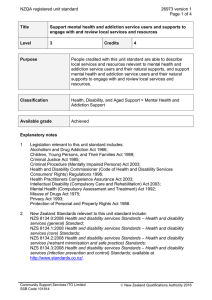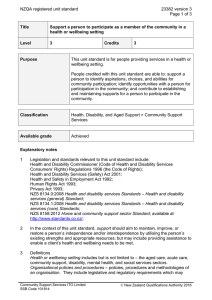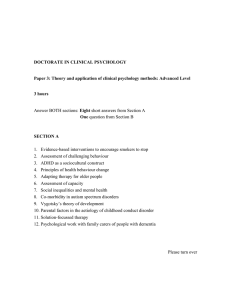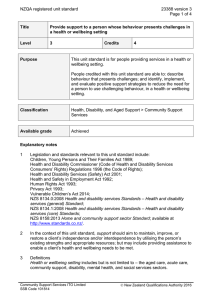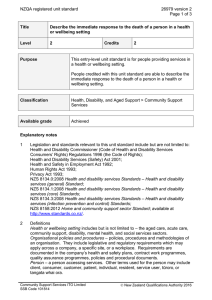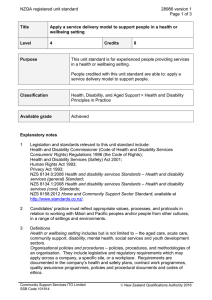NZQA registered unit standard 27081 version 3 Page 1 of 5
advertisement
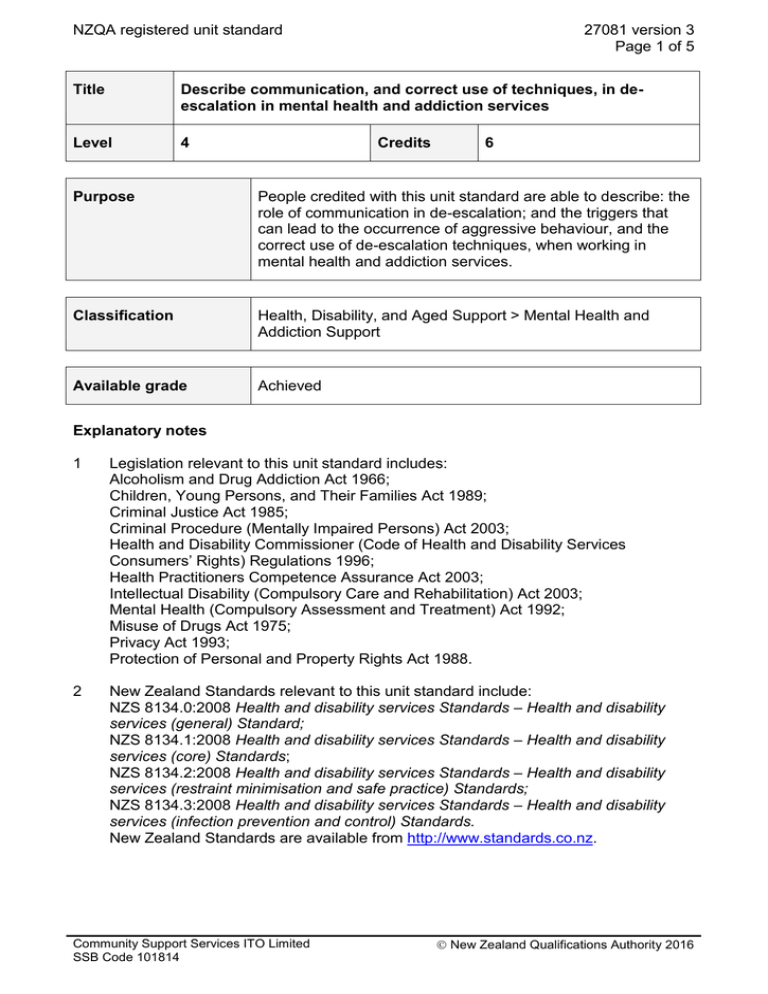
NZQA registered unit standard 27081 version 3 Page 1 of 5 Title Describe communication, and correct use of techniques, in deescalation in mental health and addiction services Level 4 Credits 6 Purpose People credited with this unit standard are able to describe: the role of communication in de-escalation; and the triggers that can lead to the occurrence of aggressive behaviour, and the correct use of de-escalation techniques, when working in mental health and addiction services. Classification Health, Disability, and Aged Support > Mental Health and Addiction Support Available grade Achieved Explanatory notes 1 Legislation relevant to this unit standard includes: Alcoholism and Drug Addiction Act 1966; Children, Young Persons, and Their Families Act 1989; Criminal Justice Act 1985; Criminal Procedure (Mentally Impaired Persons) Act 2003; Health and Disability Commissioner (Code of Health and Disability Services Consumers’ Rights) Regulations 1996; Health Practitioners Competence Assurance Act 2003; Intellectual Disability (Compulsory Care and Rehabilitation) Act 2003; Mental Health (Compulsory Assessment and Treatment) Act 1992; Misuse of Drugs Act 1975; Privacy Act 1993; Protection of Personal and Property Rights Act 1988. 2 New Zealand Standards relevant to this unit standard include: NZS 8134.0:2008 Health and disability services Standards – Health and disability services (general) Standard; NZS 8134.1:2008 Health and disability services Standards – Health and disability services (core) Standards; NZS 8134.2:2008 Health and disability services Standards – Health and disability services (restraint minimisation and safe practice) Standards; NZS 8134.3:2008 Health and disability services Standards – Health and disability services (infection prevention and control) Standards. New Zealand Standards are available from http://www.standards.co.nz. Community Support Services ITO Limited SSB Code 101814 New Zealand Qualifications Authority 2016 NZQA registered unit standard 27081 version 3 Page 2 of 5 3 Primary references Ball, T., Bush, A., & Emerson, E. (August 2004). Psychological interventions for severely challenging behaviours shown by people with learning disabilities: Clinical practice guidelines. Leicester: The British Psychological Society; available at http://www.westerncare.com/uploads/2008/Challenging.pdf. Evans, C., Humberstone,V., Maniapoto, W., McKenna, B., Simpson S., van Altvorst, S., Wack, R. (2006). Assessment and management of risk to others: Guidelines and development of training toolkit. Auckland: Mental Health Programmes Limited; available at http://www.tepou.co.nz/library/tepou/assessment-and-management-ofrisk-to-others---guidelines-and-development-of-training-toolkit-2006. Mental Health Programmes Limited. (2006). Assessment and management of risk to others: Trainee workbook. Auckland: Mental Health Programmes Limited; available at http://www.tepou.co.nz/library/tepou/assessment-and-management-of-risk-toothers-trainee-workbook-2006. Mental Health Programmes Limited. (2006). Assessment and management of risk to others: Trainer’s manual. Auckland: Mental Health Programmes Limited; available at http://www.tepou.co.nz/library/tepou/assessment-and-management-of-risk-to-others--trainers-manual-2006. 4 References American Psychiatric Association. (2000). Diagnostic and statistical manual of mental disorders – DSM-IV-TR (4th ed., Text revision). Washington DC.: Author; available at http://www.psych.org. Ministry of Health. (1998). Guidelines for clinical risk assessment and management in mental health services. Wellington: Ministry of Health in partnership with the Health Funding Authority; available at http://www.health.govt.nz. Ministry of Health. (2008). Let’s get real: Real Skills for people working in mental health and addiction. Wellington: Author; available at http://www.health.govt.nz. Te Pou o Te Whakaaro Nui, Le Va, Pasifika within Te Pou. (2009). Real Skills Plus Seitapu – Working with Pacific Peoples. Auckland: Author; available at http://www.tepou.co.nz. 5 Internet sites with additional useful information http://www.alzheimers.org.uk/site/scripts/document_pdf.php?documentID=1211 (particularly useful for care givers in dementia); http://www.rethink.org/living_with_mental_illness/caring/adjusting_to_change/tips_for _dealing_wit.html (particularly useful for care givers in mental health); http://www.challengingbehaviour.org.uk (information and support to parents and professionals caring for people with severe learning disabilities and challenging behaviour); http://www.mencap.org.uk (advice and information about tackling challenging behaviour; http://www.aboutlearningdisabilities.co.uk (advice about how to cope with challenging behaviour and where to get help). 6 In the context of this unit standard, where evidence is required to be in accordance with an appropriate source, sources may include but are not limited to the primary references, references or internet sites listed in the explanatory notes. 7 Support should aim to: maintain, improve, or restore a person’s independence and/or interdependence; utilise the person’s existing strengths; and, where possible, utilise the resources of the local community. Community Support Services ITO Limited SSB Code 101814 New Zealand Qualifications Authority 2016 NZQA registered unit standard 27081 version 3 Page 3 of 5 8 Support provided for mental health and addiction service users may include natural supports. 9 Candidates’ practice must reflect appropriate values, processes, and protocols in relation to working with Māori and Pacific peoples and/or people from other cultures, in a range of settings and environments. 10 Definitions Candidate refers to the person seeking credit for this unit standard. Correct use of de-escalation techniques in mental health and addiction services is use that is in accordance with NZS 8134.2:2008 Health and disability services Standards – Health and disability services (restraint minimisation and safe practice) Standards (refer explanatory note 2). De-escalation refers to understanding triggers for behaviour, early recognition of problems, assessment of the situation, timely interventions, self-awareness, staying calm or appearing to be calm, effective communication strategies, rapport building, empathetic and active listening, and negotiation strategies. Mental health and addiction service user in the context of this unit standard refers to a person accessing services in a mental health or addiction setting. Service users may also be known as consumers, clients, patients, tūroro, or tangata whai ora in particular contexts and settings. Potentially problematic behaviour refers to behaviour, on the part of a mental health and addiction service user, that has the capacity to interfere with the service user’s or the carer’s daily life, and to cause physical or emotional harm to self and to others (fellow service users, staff, natural supports). Potentially problematic behaviour is characteristically expressed through challenging and/or threatening attitudes, words, or actions including but not limited to: aggression; self-injurious behaviour; destructive behaviour; oppositional or stereotypical behaviour; socially inappropriate behaviour; and withdrawn behaviour. Triggers for aggressive behaviour refers to activators that may be biological, cultural, environmental, psychological, and social. Outcomes and evidence requirements Outcome 1 Describe the role of communication in de-escalation when working in mental health and addiction services. Evidence requirements 1.1 The candidate’s own verbal and non-verbal communication is described in terms of its potential impact on mental health and addiction service users’ behaviour. 1.2 The role of verbal communication techniques in de-escalating potentially problematic behaviour is described in accordance with an appropriate source. Range evidence is required for two examples of the use of verbal communication techniques in de-escalation. Community Support Services ITO Limited SSB Code 101814 New Zealand Qualifications Authority 2016 NZQA registered unit standard 1.3 27081 version 3 Page 4 of 5 The role of non-verbal communication techniques in de-escalating potentially problematic behaviour is described in accordance with an appropriate source. Range evidence is required for two examples of the use of non-verbal communication techniques in de-escalation. Outcome 2 Describe the triggers that can lead to the occurrence of aggressive behaviour, and the correct use of de-escalation techniques when working in mental health and addiction services. Evidence requirements 2.1 Types of triggers that can lead to the occurrence of aggressive behaviour by mental health and addiction service users are described in accordance with an appropriate source. Range 2.2 evidence is required for four triggers. The correct use of de-escalation techniques with mental health and addiction service users who are displaying aggressive behaviour is described in accordance with an appropriate source. Range evidence is required for four techniques, one of which uses a team approach. Planned review date 31 December 2016 Status information and last date for assessment for superseded versions Process Version Date Last Date for Assessment Registration 1 21 July 2011 31 December 2014 Revision 2 17 May 2012 31 December 2014 Revision 3 14 December 2012 N/A Consent and Moderation Requirements (CMR) reference 0024 This CMR can be accessed at http://www.nzqa.govt.nz/framework/search/index.do. Please note Providers must be granted consent to assess against standards (accredited) by NZQA, before they can report credits from assessment against unit standards or deliver courses of study leading to that assessment. Industry Training Organisations must be granted consent to assess against standards by NZQA before they can register credits from assessment against unit standards. Community Support Services ITO Limited SSB Code 101814 New Zealand Qualifications Authority 2016 NZQA registered unit standard 27081 version 3 Page 5 of 5 Providers and Industry Training Organisations, which have been granted consent and which are assessing against unit standards must engage with the moderation system that applies to those standards. Requirements for consent to assess and an outline of the moderation system that applies to this standard are outlined in the Consent and Moderation Requirements (CMR). The CMR also includes useful information about special requirements for organisations wishing to develop education and training programmes, such as minimum qualifications for tutors and assessors, and special resource requirements. Comments on this unit standard Please contact the Community Support Services ITO Limited info@careerforce.org.nz if you wish to suggest changes to the content of this unit standard. Community Support Services ITO Limited SSB Code 101814 New Zealand Qualifications Authority 2016
